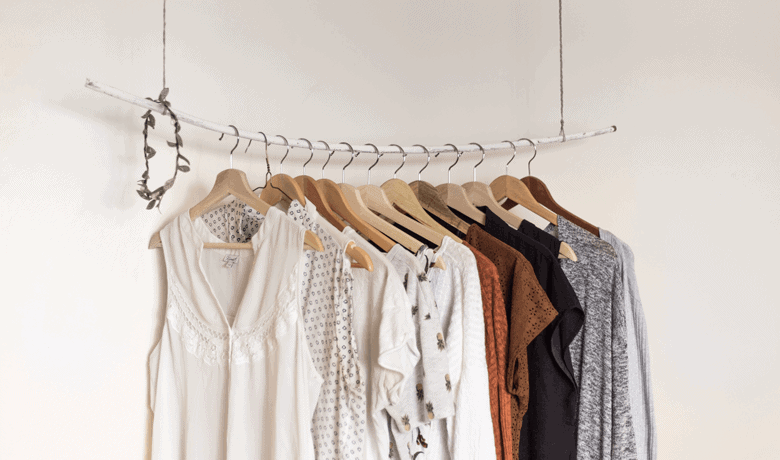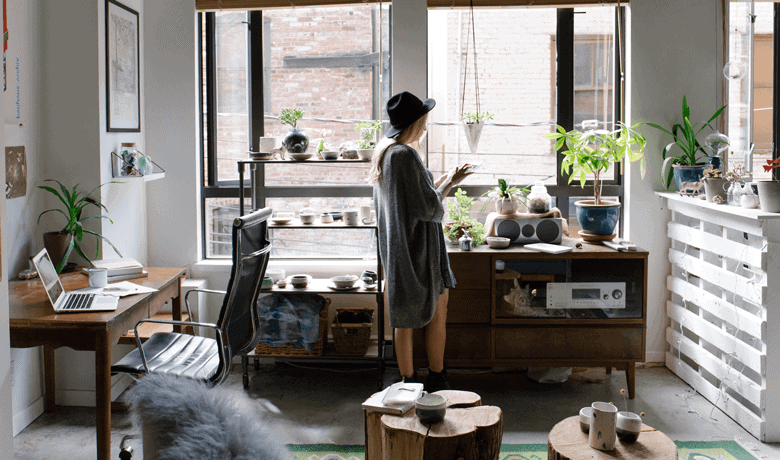When’s the last time that you opened your closet and thought to yourself, why did I buy that?! Or tried to navigate your way through piles of neglected clothes, shoes, and boxes of junk in the basement? Depending on your answers, it may be time to declutter.
All of these unwanted and unneeded things create clutter in your home. They collect dust, add stress, and cost you valuable time and money.
Accumulating stuff is easy, but trying to declutter can be extremely difficult.
The compromise is to reduce the amount of stuff that you have. Mindfully.
Decluttering your living space can be very beneficial for your health, happiness, and productivity.
Why do you attract clutter?
Do you ever feel like you have too much stuff?
Like no matter how many organizers, boxes, or storage containers you get, there never seems to be a lack of stuff to fill it?
Consumerism has become so engrained in society that quite often, you aren’t even aware of when you’re being marketed to. You make impulsive purchases that you later regret and quickly acquire a debt to pay for stuff you really don’t need or enjoy.
Decluttering mindfully can help you become more aware of your spending and collecting habits. It can help you free space for things you love but letting go of things you don’t need.
Here are some common ways that you attract clutter without even realizing it.
Sales
Believe it or not, the sale section can actually be the most expensive part of the store.
When products are marked down, there is a lure that you are getting a deal, and feel less guilty about spending money. Perhaps it wasn’t the color you had really wanted, but hey, this will do!…
This kind of attitude can lead you to fill your house with items that you don’t truly love and definitely don’t need.
Impulsive and emotional shopping
When you’re having a bad day or feeling down, one of the worst things you can do is go shopping.
Impulsive shopping is a purchase you make on a whim. You could be attracted to buying something because of your mood, a crafty marketing pitch, or feeling pressured into it.
Don’t go shopping or browsing for things. Instead, find more productive ways to use your time. If you really need to make a purchase, do your research and be mindful of fact that you are buying something.
Family and friends
When you receive a gift that you really don’t need or want, it’s easy to feel compelled to keep it.
If you’ve been keeping something because it was a gift from someone or a family heirloom but it really doesn’t bring you joy, you might want to consider letting it go.
Try asking other family members for example if they could use the item or find a friend who might use it. There are also lots of organizations that will be happy to take such items and sell them on behalf of a charitable organization.
Declutter: the benefits at home
Aside from the obvious benefits of a cleaner and more organized living space, there are lots of benefits to decluttering your home.
Some of the most notable examples include:
- removes excess stuff that collects dust and germs
- forces you to remove physical items with attachment to the past
- improves concentration
- helps you sleep
- provides a mood boost
- creates a clean energetic space
- saves time and effort (especially for cleaning and organizing)
- reduces your need to accumulate stuff
- freedom to share with others
7 Questions to help you declutter:
1. Do I love this?
The first question to ask yourself when attempting to reduce your possessions is to ask yourself, do I love this? Regardless if it’s a piece of clothing, a vase, or some old junk found in your desk, ask yourself if it’s something you really care about.
2. Would someone else enjoy this more than I do?
One of the most difficult parts of reducing possessions is throwing stuff away. There is a guilt that comes with knowing that either yourself or someone else spent money on an item that you are now getting rid of. To reduce waste and offer your things a new home, think about if there is anyone you know who would adores this item or could use it. Instead of dumping your unwanted things on others, ask your friends and family if they need anything. If you can find an item to serve this purpose, offer it to them. Otherwise, contact local organizations who could benefit from your donations.
3. Are there any negative emotions associated with this?
Far too often we get in the habit of holding onto things for sentimental reasons. If there are things in your living space that have any negative emotions or hurtful memories, get rid of them! Perhaps it was a gift from an ex or a clothing item you remember wearing to a miserable event. Get rid of it and remove any physical reminder of that memory from your home.
4. Have I used this in the past year?
Unless you are planning for an apocalypse, chances are, things you might or could use are clogging up space and collecting dust. Shoes, clothes, home décor all take up room in your place and require storage and cleaning. Simplify what you own by only keeping things that you regularly use and enjoy.
5. Would I miss this 3 weeks from now?
If you’re hesitant about getting rid of certain items, place them in a bag and store them out of sight for 3 weeks. If you haven’t needed them by the time the 3 weeks have passed and can’t even remember what you placed in the bag, chances are you really don’t need them.
6. Do I already have something similar?
How many different items do you have that offer the same utility? Do you have a drawer full of duplicate kitchen utensils, or several pairs of the same kind of shoe but always default to the same set? Streamline what you have and sort through items that you “could” or “might” need some day, to make room to better care for the products you use every day.
7. Would I buy this item again?
It’s easy to get caught up in the moment and make a purchase. This kind of impulsive buying can fill your closet and drawers with impractical items that serve little utility, bring you no joy, and require organizing. Start taking inventory of the items in your home that you really cherish and enjoy. Things that you wouldn’t buy again if you had the chance to go back in time, are likely products you no longer need.
Take away
In conclusion, the practice of learning how to declutter can be extremely beneficial.
It helps you maintain a happier, healthier, and more organized living space without drowning in excess stuff. By learning how to mindfully let go of things you no longer need nor care for, you become more aware of your spending and collecting habits.
With a little effort, you can transform your home from a densely packed maze into a peaceful and relaxing space.
Declutter your place to make space for tranquility.
Photos by: Priscilla Du Preez and Onur Bahçıvancılar


